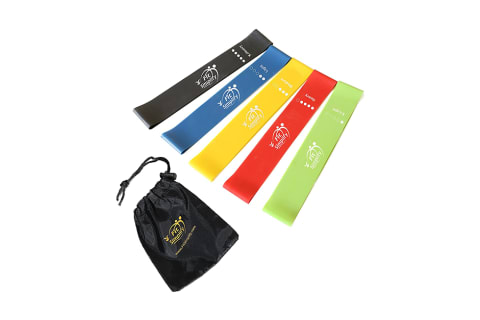Advertisement
A Progressive Jump-Squat Set To Fire Up Your Lower Body


Whether it’s pushing harder through a HIIT routine or throwing on an extra plate, transformation is rarely easy. That’s why this holiday, we’re gifting the athletes in our lives (and ourselves!) the gear to help take their passions to the next level.
Whether that’s the 4-way stretch of the Under Armour Meridian Ankle Leggings or the aerodynamic fit of their Infinity High Printed Sports Bra—Under Armour is what the everyday athlete wants to unwrap this year… Every rep, every mile, every season is a gift.
When you think about exercises to work your glutes and thighs, squats probably come to mind—and for good reason. Not only are they effective, but they can be modified in so many different ways to suit individual needs and fitness goals.
Progressive squat jumps, for example, are a challenging squat variation sure to get your heart pumping and muscles working. Here's how to do them, as demonstrated by personal trainer and fitness instructor Janeil Mason, M.S., plus tips, modifications, benefits, and the gear you'll want to get started.
How to do progressive jump squats
- Stand with your feet about shoulder-width distance apart, and bring the resistance band right above your ankles, or around your thighs, depending on how tight it is.
- Lower down into a squat position and hold, with your weight back in your heels.
- Complete 1 jump squat, then come back to that starting position. Next, complete 2 squat jumps before coming back to start.
- Continue until you reach 5 squat jumps. That's one set.
- Complete 3 full sets.
Tips & modifications
- If the progression of increasing the number of jumps is too much, stick with single jump squats, one at a time. Similarly, you can also omit the jump altogether and just focus on squatting with your resistance band.
- Because this exercise isn't exactly easy on the joints, make sure you're doing this on a surface that provides a bit of cushion, as opposed to asphalt.
- To make this move more challenging, you can jump up onto a slightly elevated surface and then jump back down into your squat.
- Another way to make this move more challenging is to tuck your knees in toward your chest on the jump up—just make sure you've mastered the jump squats before trying this version.
What are the benefits?
Squats are known for working your glutes, thighs, hips, and even core when engaged properly. And by adding a resistance band and jumps into the mix, you're not only ensuring that your joints stay in alignment, but you'll be working your muscles more.
And as Mason previously explained to mbg, she loves working out with a mini resistance band "because it adds an extra challenge to any bodyweight routine—and unlike bulkier equipment, a mini band is so easy to transport just about anywhere. Plus, this seemingly simple resistance loop is so versatile—taking bodyweight exercises for your back, legs, core, etc., to the next level."
Plus, progressive jump squats are great for a quick, midday movement break, or, if you're doing a lengthier workout, you can sprinkle them into the mix.
Gather your gear
The takeaway
Whether you're at home, in the gym, or working out in your local park, having a handful of exercises that require minimal equipment makes working out all the more simplified. So the next time you want to get your lower body fired up, be sure not to forget about these progressive jump squats.


